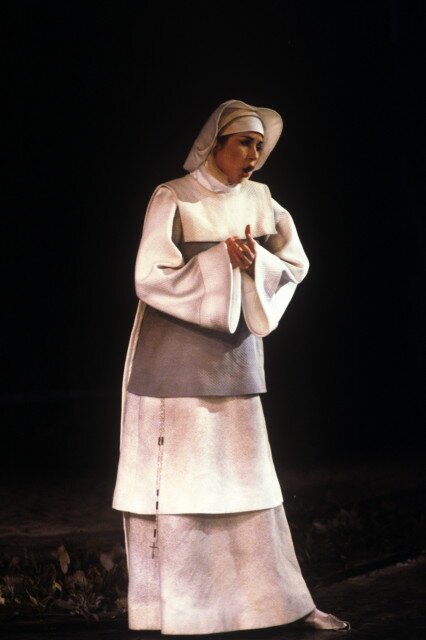This past Saturday, Seattle Opera opened a double bill of La Voix Humaine and Suor Angelica. The two, short operas will run through May 18 with five more performances. These are the last performances of the 2012 – 13 season and, sadly, they bring down the house on Seattle Opera subscription seasons as we have known them over the last 30 years. It was therefore a landmark night, though few noticed.
Since the mid-1980s, Seattle Opera has run five operas a season (though, as with this season, they have occasionally run two shorter operas together). Due to the lingering recession, a declining subscriber base, the inability to develop a larger, younger audience; and some major budget shortfalls, this will be the last five-opera subscriber series for the near future. This summer, the Opera will produce the Wagner Ring Festival, followed by a four-opera season, and in 2014, faithful subscribers will face famine with only three operas, plus have the chance to attend the International Wagner Competition, instead of a Meistersinger previously planned, along with their subscription season.
But if this is the end of an era, the Opera is going out on top. 2012-13 was one of the company’s best seasons in years. Seattle Opera presented a dazzling, exotic turn on Puccini’s Turandot; a somber, tense reading of Beethoven’s Fidelio; a rollicking, wickedly funny take on Rossini’s La Cenerentola; a breathtaking, beautiful conception of Puccini’s La bohème, and has concluded the season with this double-bill.
I don’t see how La Voix Humaine and Sour Angelica could be much better. Composed by Francis Poulenc in 1959, with a libretto by Jean Cocteau, La Voix Humaine is a short, powerful take on the end of a love affair. Only one performer takes the stage. In this case, Elle, the spurned lover who is caught in a long telephone call with her departed lover, carries the show.
Portrayed by the amazing Nuccia Focile, Elle is part courage, part anger, and partly on the verge of a nervous breakdown. Focile navigates the story with uncommon acting chops and a luscious, supple voice that conveys both the depth of Elle’s despair and the character’s strong will. The story feels modern, and the music, under the sympathetic baton of conductor Gary Thor Wedow, is romantic, lustful, and complex.
The modernity, ironically, comes from its portrayal of 20th-century communications – how they tend to separate us and interfere with our emotions. Who among us hasn’t been on one of those calls where you would say anything to make a lover stay on the phone just a minute longer? Responding to her lover’s question about her possible suicide, Elle says, “Can you imagine me with a gun? I don’t even know where to get one.”
Focile, who has done magnificent work at Seattle Opera as Iphigénie in Iphigénie en Tauride and many others, moves around the single bedroom set with grace and excellence; at one point she wraps the phone cord around her neck and in the audience there is a chilling sense of doom. She is a revelation as both a singer and actor here.
Luckily, the composer and librettist give her a few moments of humor as the phone continually drops out or unseen callers join her party line. No one in the audience will miss the point that service assurance wasn’t any better for 50s-era French landlines than it is for 21st-century cell users. At one point, Elle even says, “Can you hear me now?”
With only one singer and one set, this opera can’t be very expensive to mount, and I wonder if Seattle Opera’s creative team couldn’t find other small opera gems to expand future seasons. Menotti’s The Medium, anyone? With someone as powerful as Focile, even modest opera is a wonder to behold.
The second half of the night’s double treat was a seldom-seen Puccini opera, Suor Angelica. Set in an abbey in 1600s Italy, the opera, with its all-women cast, presents us with the story of a humble nun who was once a princess. The young princess had a child out of wedlock, was separated from her son, and sent to a lifetime of penance as an abbess.
This one-act opera starts with Angelica working in the abbey’s garden. Other nuns gently tease her about her past, but, inwardly, she is desperate to hear news from her family. It has been seven long years since she last held her newborn. In a plot worthy of O’Neill or O. Henry, Angelica is visited by her aunt on official family business, who near the end of her visit offhandedly mentions to Angelica that her son is dead, a victim of an unidentified illness.
In her sorrow, Angelica makes the heart-rending decision to take her life. As the poison takes effect, she realizes she has committed a mortal sin.
General Director Speight Jenkins was canny to put these two operas together. Both are stories of discarded women who are robbed of everything they have, even their illusions. Maria Gavrilova sings the role of Sister Angelica with power and sadness. It would be easy to see Angelica as a victim, but Gavrilova steers the character out of the pits of despair and presents her as a strong-willed, but naïve woman.
Rosalind Plowright plays the pious aunt with bone-hard conviction and holier-than-thou righteousness. With acting skills to match her instrument, Plowright comes up with the best performance I’ve seen at Seattle Opera this year.
Also coming through with an amazing performance is the Seattle Opera chorus under the direction of chorusmaster Beth Kirchhoff. Kirchhoff is a jewel among music direction in Seattle or anywhere else. In Suor Angelica, she guides the women’s chorus through a triumphant reading of Puccini’s music, which has overtones of sacred vespers. It’s powerfully nostalgic if, like me, you were taught by Catholic nuns, who sang their morning devotions.
Despite the evening’s sad overtones, you walk out thinking about miracles — a happy presentation for all concerned.


